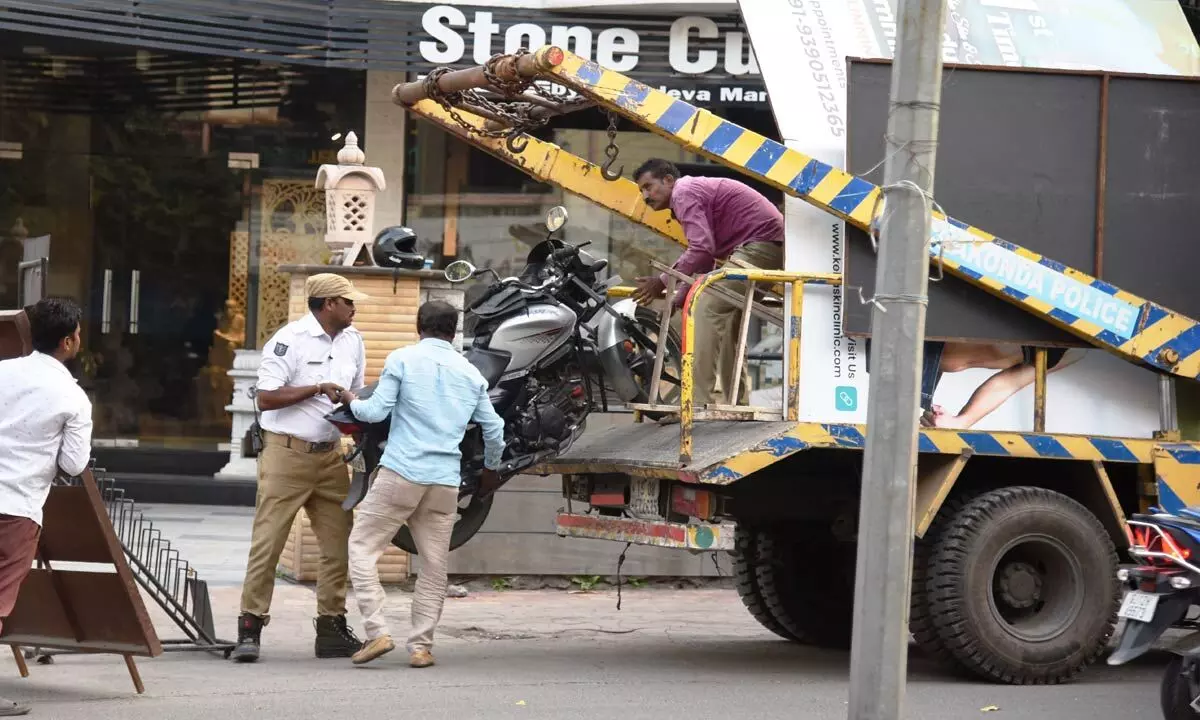Quick commerce stores spawn congestion in Hyd’bad colonies

Over 150 gig workers visit each warehouse on a daily basis, adding to congestion
Hyderabad: The swift expansion of quick commerce warehouses across the city is leading to growing disruptions in residential areas, primarily due to improper vehicle parking. Over 150 gig and platform workers visit these warehouses regularly, resulting in considerable traffic congestion in neighbourhoods and on narrow streets. Moreover, these workers often disregard traffic laws, exhibiting reckless behaviours like driving against the flow of traffic, ignoring signals, and speeding—all in a bid to ensure timely parcel deliveries to customers.
The quick commerce industry is pushing fast-moving consumer goods companies to curtail sales to distributors across the city. Notably, warehouses for companies like Zepto, Swiggy Instamart, and Zomato are increasingly located in residential neighborhoods. This trend raises significant concerns among residents, particularly regarding chaotic parking situations and the frequent presence of delivery agents in their communities.
According to the Telangana Gig and Platform Workers Union, each warehouse is staffed between 150 and 200 workers. These warehouses are strategically located in regions that experience a high volume of customer orders, ensuring efficient service and timely deliveries.
In numerous residential areas such as Uppal, L B Nagar, Malakpet, Santosh Nagar, Nampally, Kothi, Tolichowki, Ameerpet, Jubilee Hills, Banjara Hills, Madhapur, Kukatpally, and Hitech City, the establishment of warehouses has led to significant traffic issues. “The influx of hundreds of workers visiting these locations causes severe congestion. With 40 to 50 bikes parked simultaneously, we residents experience daily disruptions due to gig workers improperly parking and driving against traffic. These warehouses should not be in residential areas,” expressed K Venkatesh, a concerned resident of Uppal.
The TGPWU State President, Shaik Salauddin, emphasised that when a company establishes a warehouse, it must also ensure adequate parking facilities, especially since around 150 workers frequent the site regularly. Moreover, he pointed out that despite multiple requests made to the platform and app companies to either eliminate or extend the delivery time limits, no action has been taken. “In order to meet the tight delivery schedules, these workers are forced to park their bikes chaotically, striving to complete their pickups and deliveries within the 10-minute window set by the companies,” he stated.
The delivery agents were hired to follow one simple agenda in order to get better at work, which is to deliver the parcel as quickly as possible. For the same, they are often seen driving rashly in order to beat the traffic and reach their delivery point quickly. Following this, the app-based aggregators in the city were fined multiple traffic challans.
Salauddin said that the 10-minute delivery window forced the workers to drive on the wrong side, signal jumping, and overspeeding. He said, “The race against the clock can lead delivery workers and bike taxi drivers to violate traffic rules, such as jumping signals or speeding. These violations often occur because workers are incentivised to complete as many deliveries as possible within short time frames, sometimes sacrificing safety. When workers are pushed to make deliveries within short time windows, like 10 minutes, they tend to take risks that increase the likelihood of accidents,” he added.
“To address these issues, solutions should focus on establishing fair pay systems that do not incentivise risky behaviour, providing better support and protection for gig and platform workers, and ensuring proper enforcement of traffic rules. The government should intervene and focus on the companies' short-time window in which workers tend to take risks,” said Salauddin.



















